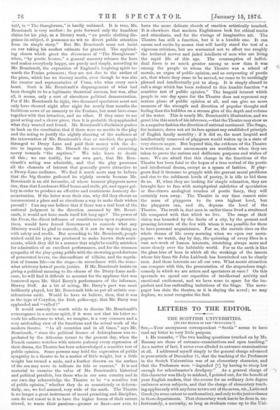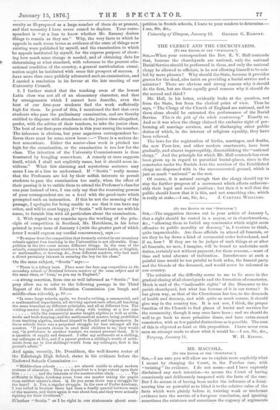LETTERS TO THE EDITOR.
THE SCOTTLSH UNIVERSITIES.
[TO TER EDITOR OF THE "SPECTATOR."]
Stn,—Your anonymous correspondent " Scotia " seems to have read my letter to very little purpose.
1. He remarks, "The two leading questions touched on by Mr. Ramsay are those of entrance-examinations and open teaching." As a matter of fact, I never even alluded to entrance-examinations at all. I addressed myself simply to the general charge advanced in your article of December 11, that the teaching of the Professors in the Scotch Universities was of an elementary character, and that the Professors were "degraded [2] by having to stoop low enough for schoolmaster's drudgery." As a general charge of this character was likely to mislead, I pointed out, for the benefit of your English readers, that the course for an ordinary Arts degree embraces seven subjects, and that the charge of elementary teach- ing applies only with any force to two out of the seven, viz., Latin and Greek (to some extent to mathematics), and only to the junior classes in those departments. That elementary work has to be done is, un- fortunately, a necessity, so long as students come up to the Uni-
versity as ill-prepared as a large number of them do at present, and that necessity I have never ceased to deplore. Your corre- spondent is "at a loss to know whether Mr. Ramsay desires things to remain as they are." Why, the very facts to which he appeals in such warm terms as evidence of the state of things now existing were published by myself, and the examination to which lie appeals instituted by myself, for the express purpose of show- ing how much some change is needed, and of obtaining data for
it determining at what standard, with reference to the present edu- cational condition of the country, a general matriculation exami- nation might be instituted with some fair prospect of success. I
lave more than once publicly advocated such an examination, and I carried a resolution in its favour at the late meeting of our University Council.
2. I further stated that the teaching even of the lowest Latin class was not all of an elementary character, and that by arrangements which I cannot here describe, even the best of our first-year students find the work sufficiently high for them. In proof of this, I mentioned the fact that even students who pass the preliminary examination, and are thereby entitled to dispense with attendance on the junior class altogether, prefer, with the advice of their teachers, to take the junior class. The best of our first-year students is this year among the number.
The inference is obvious, but your sagacious correspondent be- lieves there must be some screw loose :—" There is a serious de- fect somewhere. Either the senior-class work is pitched too
high for the examination, or the examination is too low for the "class. The intention of the University Commissioners is thus frustrated by bungling somewhere. A remedy at once suggests itself, which I shall not explicitly name, lest it should seem in- vidious." What this alarming and mysterious sentence may mean I am at a loss to understand. If " Scotia " really means that the Professors are led by their selfish interests to permit students to pass the examination too easily, when the effect of their passing it is to entitle them to attend the Professor's class for one year instead of two, I can only say that the reasoning powers of your correspondent are on a level with the good-taste which prompted such an insinuation. If this be not the meaning of the passage, I apologise for being unable to see that it can have any other, and will be most happy, if " Scotia" will favour me with his name, to furnish him with all particulars about the examination.
3. With regard to my remarks upon the working of the prin- -eiple of competition in Scotland, Mr. Hutchison, in his letter printed in your issue of January 1 (with the greater part of which 'letter I would express my cordial concurrence), says :—
"To argue from the competition that formerly existed in our secondary schools against free teaching in the Universities is not allowable. Com- petition in the two cases moans different things. In the case of the _schools, competition meant whether a boy should learn Latin, or English, or mathematics, or drawing, &c., from different masters, who had each a direct pecuniary interest in securing the boy for his class."
'On the same subject, "Scotia" says :—
" There is a fallacy here. There never has been any competition in the .secondary schools of Scotland between masters of the same subject and of the same class, or 'form,' as you say in England,"
—a strong assertion, from one so well informed as "Scotia ;" but pray allow me to refer to the following passage in the Third Itaport of the Scotch Education Commission (on burgh and middle-class schools), p. 99 :—
" In some large schools, again, we found a writing, a commercial, and a mathematical department, all striving against each otheri all teaching the same branches on different principles, and all at different fees. The writing-master taught arithmetic along with writing at a low rate
• while the commercial master taught algebra as well as arith- metic and book-keeping; and the mathematical master, being prohibited _from teaching algebra, confined himself to Euclid and trigonometry. In _those schools there was a perpetual struggle for foes amongst all the masters. 'If parents choose to send their children to us,' they would say, 'in preference to another teacher, we cannot prevent them. It is a question of supply and demand. I offer my arithmetic at a shilling, _my colleague at five, and if a parent prefers a shilling's-worth of arith- metic from me to five shillings'-wortb from my colleague, that is the parent's affair.'"
And again, recently, Dr. Donaldson, the well-known rector of the Edinburgh High School, states in his evidence before the Endowed Schools Commission
"Middle-class schools are almost unable to adopt modern
systems of education. They are dependent to a large extent upon their
-fees and the interests of the masters often clash The difficulty in Elgin Academy arose from one master taking the pupils from another master's class. Q. Do you mean there was a struggle for the boys? A. Yes, a regular struggle. In the case of Forfar Academy, 'I was called in because there had been a deadly quarrel between some .of the masters, and there again it was about fees, and they were actually fighting for their livelihood."
Whether " Scotia " or I be right in our statements about corn- petition in Scotch schools, I leave to your readers to determine.—
I am, Sir, &c., University of Glasgow, January 10. GEORGE G. RAMSAY.



































 Previous page
Previous page